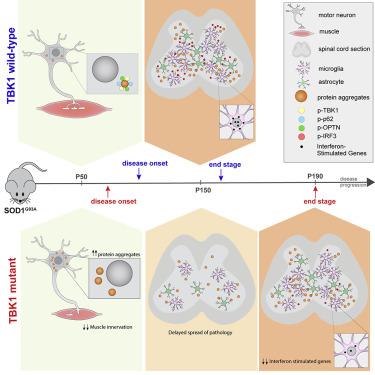Neuron ( IF 14.7 ) Pub Date : 2020-03-27 , DOI: 10.1016/j.neuron.2020.03.005 Valeria Gerbino 1 , Esther Kaunga 1 , Junqiang Ye 1 , Daniele Canzio 1 , Sean O'Keeffe 2 , Noam D Rudnick 2 , Paolo Guarnieri 3 , Cathleen M Lutz 4 , Tom Maniatis 5

|
DNA sequence variants in the TBK1 gene associate with or cause sporadic or familial amyotrophic lateral sclerosis (ALS). Here we show that mice bearing human ALS-associated TBK1 missense loss-of-function mutations, or mice in which the Tbk1 gene is selectively deleted in motor neurons, do not display a neurodegenerative disease phenotype. However, loss of TBK1 function in motor neurons of the SOD1G93A mouse model of ALS impairs autophagy, increases SOD1 aggregation, and accelerates early disease onset without affecting lifespan. By contrast, point mutations that decrease TBK1 kinase activity in all cells also accelerate disease onset but extend the lifespan of SOD1 mice. This difference correlates with the failure to activate high levels of expression of interferon-inducible genes in glia. We conclude that loss of TBK1 kinase activity impacts ALS disease progression through distinct pathways in different spinal cord cell types and further implicate the importance of glia in neurodegeneration.
中文翻译:

运动神经元或所有细胞类型中TBK1激酶活性的丧失差异性影响SOD1小鼠的ALS疾病进展。
TBK1基因中的DNA序列变异与散发性或家族性肌萎缩性侧索硬化症(ALS)相关或引起散发性或家族性肌萎缩性侧索硬化症(ALS)。在这里,我们显示带有人ALS相关的TBK1错义功能丧失突变的小鼠,或在运动神经元中选择性删除Tbk1基因的小鼠,未显示神经退行性疾病表型。然而,SOD1 G93A的运动神经元中TBK1功能丧失ALS的小鼠模型损害自噬,增加SOD1聚集,并在不影响寿命的情况下加速疾病的早期发作。相比之下,降低所有细胞中TBK1激酶活性的点突变也可加速疾病发作,但可延长SOD1小鼠的寿命。这种差异与激活胶质细胞中干扰素诱导基因的高水平表达失败有关。我们得出的结论是,TBK1激酶活性的丧失会通过不同脊髓细胞类型中的不同途径影响ALS疾病进展,并进一步暗示神经胶质细胞在神经变性中的重要性。











































 京公网安备 11010802027423号
京公网安备 11010802027423号